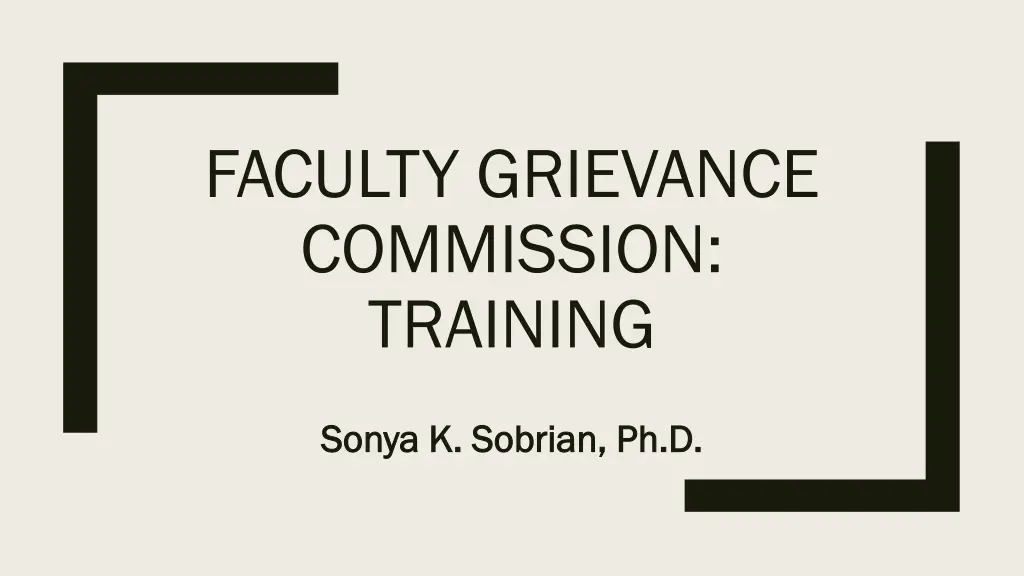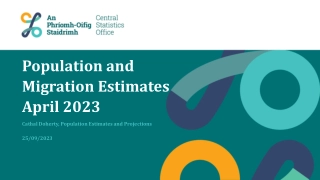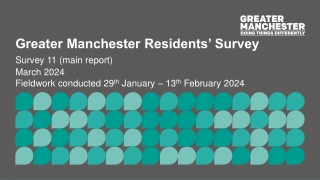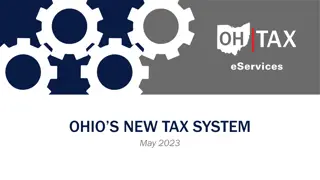
Understanding Faculty Grievance Commission and Procedures
Explore the role and procedures of the Faculty Grievance Commission in handling grievances related to faculty members' personnel status, employment terms, academic freedom, discriminatory actions, and more. Learn about the structure, jurisdiction, and election process of this commission as outlined in the Faculty Senate Constitution and By-laws.
Download Presentation

Please find below an Image/Link to download the presentation.
The content on the website is provided AS IS for your information and personal use only. It may not be sold, licensed, or shared on other websites without obtaining consent from the author. If you encounter any issues during the download, it is possible that the publisher has removed the file from their server.
You are allowed to download the files provided on this website for personal or commercial use, subject to the condition that they are used lawfully. All files are the property of their respective owners.
The content on the website is provided AS IS for your information and personal use only. It may not be sold, licensed, or shared on other websites without obtaining consent from the author.
E N D
Presentation Transcript
FACULTY GRIEVANCE COMMISSION: TRAINING Sonya K. Sobrian, Ph.D. Sonya K. Sobrian, Ph.D.
The FGC & the Faculty Senate Constitution Article VII Senate Committees The Faculty Grievance Commission is not mentioned in The Constitution of the Faculty Senate. Section A. Standing Committees: The following shall be the standing committees of the Senate: 1. Joint Committee on Academic and Health Affairs 2. Committee on Appointments, Promotions and Tenure 3. Committee on Budget and Planning 4. Committee on Committees 5. Committee on Community Relations, Student and Alumni Affairs 6. Committee on Faculty Grievance and Ethics 7. Committee on Faculty Welfare 8. Committee on Governance, Constitution and By-law Revision 9. Committee on Library Systems, Research and Resources 10. Committee on Rules 3
The FGC and the By-laws of the Faculty Senate Article II. Standing and Special/Ad Hoc Committees of the Faculty Senate 9. Faculty Grievance Commission (not a standing committee) This Commission shall have jurisdiction over: a. matters referred to it by the University administration (under the provisions of the Faculty Handbook). b. University policy and procedures regarding the handling of faculty grievances: A grievance is a complaint where action has been taken involving a faculty member s personnel status, the terms and conditions of employment, and which at the same time includes any or a combination of the following: 1. a violation of academic freedom; 2. arbitrary and capricious action; 3. discrimination with regard to gender, race, ethnic origin, age, religion, handicap, or sexual preference; 4. violation of established rules and procedures. This Commission shall consist of seven full-time, tenured faculty members, elected at-large by the Faculty Senate. 4
The FGC and the By-laws of the Faculty Senate A Hearing List of thirty [30] tenured faculty members representing all schools and colleges shall be elected at large by the Senate. On the Hearing List, two representatives from each school/college/unit shall be seated before additional representatives will be seated by popular vote. No administrative officer or department chair may be elected to the Faculty Grievance Commission or Hearing List. Members of the Hearing List will be selected to serve on a Hearing Panel if formal procedures are invoked. Members of the Commission serve two-year terms. Members of the Hearing Panel [List] serve three-year terms. The appointments are staggered so that only about one-third of the Hearing Panel terms expire each year. (see [1993] Faculty Handbook, Sec. 2.8.3, for additional details on the operation of the Faculty Grievance Commission). 5
The FGC and the 2019 Faculty Handbook Chapter F: Faculty Grievances, the Faculty Grievance Commission (FGC), and FGC Procedures 74 Section F1: Grievable Matters 74 F1.1 Eligibility of Faculty Members to Initiate Grievances 74 F1.2 The Faculty Grievance Commission (FGC) 74 Section F2: Procedures Governing Appeals of Recommendations to Impose Major Disciplinary Sanctions or Termination 76 F2.1 Appeals of Major Disciplinary Sanctions or Termination 76 F2.2 Filing a Complaint 76 F2.3 The Formal Hearing 77 Section F3: Procedures Governing Appeals of Negative Recommendations at the School/College Level Regarding Applications for Reappointment, Tenure, or Promotion of Tenured, Probationary Tenure Track, and Non Tenured Renewable Term Appointment Faculty Members 79 F3.1 Filing the Appeal 79 F3.2 The Formal Review 80 Section F4: Procedures Governing Grievances Involving Faculty Complaints against Another Faculty Member for Non Disciplinary Actions 81 F4.1 Jurisdiction of the FGC and Acceptance of the Complaint 81 F4.2 The Formal Hearing 81 Section F5: Procedures Governing Grievances Involving Complaints against Certain Administrators 82 F5.1 Jurisdiction of the FGC and Acceptance of the Complaint 82 F5.2 The Formal Hearing 82 6
FGC Cases: Suggested Intake Assign numbers to the different cases so that they can be referred to without the name of the grievant in correspondence. FGC-01-COM-2012 FGC Faculty Grievance Commission 01 Number of the case [Suggest now numbers start at 100] COM Abbreviation for the School or College in which the grievant was a Faculty member 2012 Year that the case was sent to the FGC [All cases were given a number whether or not the Commission choose to act on them.] Acknowledge receipt of grievance to Grievant and Respondent All complaints should be sent to both the Office of the Faculty Senate and the Chair of the FGC Sending grievances to the Office of the Faculty Senate will assure continuity FGC Meetings: It is unlikely that a 1 meeting per month will work, given the time-lines built into the 2019 Handbook. During my tenure as Chair, it was sometimes necessary to meet twice a week. However, twice a month was more usual. FGC also met during Spring Break, and during the summer. 7
Training Prescribed In 2019 Handbook F1.2.2: Members of the FGC and of the Hearing List shall receive appropriate training regarding the proper procedures for conducting hearings. Persons elected to serve on the FGC may not serve simultaneously as a member of the Hearing List. F1.2.3: Decisions and resulting recommendations (from the grievance process) will be based on the preponderance of evidence. 8
CHAPTER F: * FACULTY GRIEVANCES, THE FACULTY GRIEVANCE COMMISSION (FGC), AND FGC PROCEDURES Section F1: Grievable Matters * 2019 HU Faculty Handbook 9
F1.2 The Faculty Grievance Commission: Membership The Faculty Grievance Commission (FGC) consists of one representative from each of the schools and colleges (except the Graduate School), elected at-large by the faculty of the respective schools and colleges. [1993 Handbook specified members had to be tenured] No faculty member can serve on the FGC for more than two consecutive 2-year terms, although subsequent reelection is permitted. No administrative officer, department chair, or assistant or associate dean may serve on the FGC. The FGC will conduct business during the summer months as well as during the academic year, with a simple majority constituting aquorum [N = 7]. Members of the FGC can be removed for failure to perform their duties by recommendation of one or more members of the FGC. FS Council shall decide by majority vote whether to accept the recommendation. Process is not indicated 10
Chair of the FGC No administrative officer, department Chair, or assistant or associate dean may serve on the FGC. The FGC shall annually elect a Chair from among its current members. The Chair shall serve as the presiding officer of meetings of the FGC. Specific tasks are indicated in following slides. 11
Section F1.2.2 Hearing Lists The Hearing List is elected from members of each school/college. Necessary elections should be held at the start of each academic year. Each school/college (except the Graduate School) will elect three (3) tenured faculty to serve as members of the Hearing List. The members of the Hearing List will, as selected, serve as members of Formal Hearing Panels. Members of the Hearing List shall be elected for three year terms, staggered so that the terms of approximately one third of the members shall expire each year. Members of the Hearing List may be re elected to a second three year term, but no person shall serve more than two (2) terms consecutively. Persons elected to serve on the FGC may not serve simultaneously as a member of the Hearing List. A Hearing Panel is selected from the members of the Hearing List.
F1.2.1 F1.2.1 The The FGC s FGC s Authority: F Authority: Faculty Grievances A grievance is a complaint alleging that a disciplinary action (or other adverse action) has been taken that has the potential to affect the faculty member's appointment status, or the terms and conditions of employment, or abridge another right that all faculty members enjoy [Not Specified] The Faculty Grievance Commission has authority in four varieties of cases: (1) appeals of recommended major disciplinary sanctions; [& termination] (2) appeals of negative recommendations for reappointment, tenure, and/or promotion; (3) grievances against another faculty member; and (4) grievances against administrators in cases that do not involve disciplinary actions. The procedure for resolving each is somewhat different 13
SECTION F2: PROCEDURES GOVERNING APPEALS OF RECOMMENDATIONS TO IMPOSE MAJOR DISCIPLINARY SANCTIONS OR TERMINATION 14
F2.1. Appeals of recommended major disciplinary sanctions 1) Appeals of recommended major disciplinary sanctions Only faculty members who are tenured or probationary tenure track, or who hold a non tenured renewable term appointment, may appeal a recommended major sanction to the Faculty Grievance Commission. When a temporary faculty member (including all full time faculty on appointments of one year or less, as well as part time adjunct faculty who are not covered by a collective bargaining agreement) is recommended for a written reprimand or a major sanction, the procedures governing the administration of a written reprimand described in Section E2 will apply. [Section E2: Written Reprimands] However, these faculty members may not appeal to the Faculty Grievance Commission. Disciplinary procedures regarding faculty members in a collective bargaining unit are covered by the applicable collective bargaining agreement. 15
1. Appeals of recommended major disciplinary sanctions: Cause The following grounds may lead to a recommendation for a major sanction if they are related, directly and substantially, to the fitness of faculty members in their professional capacities as teachers or researchers. Continued neglect of academic duties, despite oral and writtenwarnings; Falsification or misrepresentation of credentials or professional experience; Professional misconduct or loss of required professional certification or licensure; Serious personalmisconduct; [Not defined] Deliberate and serious violations of the rights and freedom of fellow faculty members, administrators, or students; Serious violation of the Faculty Handbook, the Employee Handbook, and other University policies, typically after oral and/or written warning; Retaliation; Bullying; and Admission or conviction of a felony or misdemeanor involving moral turpitude. Legal definition of moral turpitude: an act or behavior that gravely violates the sentiment or accepted standard of the community. 16
F2.1 F2.1 Appeals Appeals of of Major Major Disciplinary Disciplinary Sanctions Sanctions or or Termination: Termination: Sanctions Sanctions There are 7 major sanctions which can impact a faculty members professional standing or reputation: Dismissal for just cause or termination; Suspension; If the recommended sanction is either suspension or termination, the faculty member may be suspended with or without pay during the pendency of the appeal. Demotion or reduction in rank; Revocation of tenure; Removal of teaching or research or clinical responsibilities for disciplinary reasons; Salary reduction; Terminations pursuant to Section B3.3.2.3 [Long-Term Leave: documented medical disability]; and Any other action that may seriously affect a person s professional standing or reputation; However, this does not include any form of oral or written warning. Faculty member may appeal to the FGC. The President is the final decisional authority. 17
Intake/Processing of Grievance Matters (1) Appeals of recommended major disciplinary sanctions When a faculty member who has been recommended for a major sanction informs the Provost of his or her intention to appeal to the FGC, the Provost notifies the chair of the FGC, and Forwards the recommendation to impose the major sanction with the case file of supporting documentation. The chair of the FGC forwards [Time frame not specified] copies of the recommendation and the case file to the grievant with instructions that he/she has thirty (30) days to file the complaint. Upon receiving the complaint submitted by the grievant, the chair of the FGC will: (a) acknowledge receipt to the grievant and to the respondent; (b) notify the Provost and the chair of the Faculty Senate that the grievance has been received; and (c) inquire if the parties wish to submit the matter to mediation. If the grievant and respondent agree to mediation, a professionally trained and mutually agreed upon mediator will be retained. If, at the end of thirty (30) calendar days, the mediation does not result in a written agreement memorializing the terms of resolution, the chair of the FGC will move the complaint into the Formal Hearing process. If the grievant and respondent do not agree to mediation, the complaint is referred to a Hearing Panel. In either case, the Formal Hearing process is considered initiated at this time. [??] 18
(1) Appeals of recommended major disciplinary sanctions: (1) Appeals of recommended major disciplinary sanctions: F2.3.1. Hearing Panel F2.3.1. Hearing Panel Within three (3) academic weeks of when the chair of FGC initiates the formal hearing process, the FGC chair will constitute a Hearing Panel as follows: [It consists of 5 members] Grievance hearings are not formal judicial proceedings; they are internal University proceedings. Their purpose is to provide a fair and neutral evaluation of the allegations listed in the complaint. The grievant and respondent shall each select two candidates respectively from the elected Hearing List. The FGC chair shall select a fifth who shall act as Chair of the Hearing Panel. Members of the Hearing List who have a personal bias or conflict of interest will remove themselves from consideration, either at the request of the grievant or respondent, or on their own initiative. [Issues of Confidentiality in asking members of the Hearing List to participate.] If, at any time during the deliberations a conflict of interest arises or is discovered, the chair of the Hearing Panel will take action to eliminate the conflict. 19
(1) Appeals of recommended major disciplinary (1) Appeals of recommended major disciplinary sanctions: sanctions: F2.3.1. Hearing Panel [ F2.3.1. Hearing Panel [con t con t] ] Additionally, members of the Hearing List with current and pending complaints against the University may not serve, nor may members of the same department (or, in cases wherein the grievant is affiliated with a school without departments, from the same school) as the grievant or the respondent. The final decision with respect to whether a member should hear the grievance rests with the remaining panel members. Once the Hearing Panel is constituted, the FGC chair will forward all materials in the case to the Hearing Panel chair. The Hearing Panel s final recommendation shall be based solely on the preponderance of evidence presented during the hearing. 20
F2.3.2: Hearing Procedures After the Hearing Panel is constituted, the Hearing Panel chair will notify all parties in writing, within two (2) academic weeks, that formal proceedings will be initiated and of the time and place of the hearing. The Hearing Panel chair will also send to the Provost a summary statement of the evidence proposed to be presented by the grievant, a list of witnesses to be called, and copies of relevant documents. A transcript of each hearing will be prepared and a copy will be made available, upon request, to both parties without cost. The Hearing Panel must complete its hearings and reach its final decision within eight (8) academic weeks of the notice. No later than thirty (30) business days after the conclusion of the hearing, the Hearing Panel chair will transmit the recommendation and the case file to the FGC chair, and the FGC chair will forward a copy of the recommendation to the grievant, the respondent, and to the Provost. The Hearing Panel may request a time extension from the Faculty Senate Chair; if granted, such an extension may not to exceed ten (10) business days.[ F2.3.3 Recommendation] 21
F2.3.2: Hearing Procedures [cont] If either the grievant or the respondent wishes to appeal, the request for an appeal must be submitted in writing to the FGC chair through the Office of the Faculty Senate within fifteen (15) business days of receiving the Hearing Panel s recommendation. [F.2.3.4 Appeal] Upon receipt of an appeal, the Chair will convene the FGC. Within thirty (30) business days of receiving the notice of appeal, the FGC members hearing the appeal will decide, by majority vote, whether to sustain, modify or remand the Hearing Panel recommendation and notify all the parties of the decision. In cases that are remanded, the Hearing Panel has ten (10) business days to report back to the FGC. After the FGC concludes the appeal process, the case is returned to the Provost for reconsideration. Within ten business days of receiving the report, the Provost will forward the recommendation and the entire case file to the President for review and final decision. If neither the grievant nor the respondent chooses to appeal the findings of the Hearing Panel, the chair of the FGC will forward the case file to the Provost, who, in turn, will forward the entire case file to the President for final decision. 22
F2.3.5 F2.3.5 Final Final Decision Decision The President's decision will be communicated, in writing, to the FGC Chair, the Provost, the grievant, and the respondent within thirty (30) business days of receiving the recommendation from the FGC. Whether or not the President imposes the recommended sanction, the seriousness of all disciplinary cases that result in a recommendation for a major sanction warrants that the President will provide a full explanation of his or her decision. If the final decision supports the imposition of a major sanction, the President will, in a separate communication, notify the grievant, the respondent, and the Provost, informing him or her of the sanction and the effective date(s). In cases wherein the recommended sanction was termination, the President may impose a lesser sanction. The President s decision is not subject to further grievance to the FGC. 23
SECTION F3: APPEALS OF NEGATIVE RECOMMENDATIONS FOR REAPPOINTMENT, TENURE, AND/OR PROMOTION 24
The Process (2) Appeals of negative recommendations for reappointment, tenure, and/or promotion. WHO: Tenured faculty members, probationary tenure track faculty members, and faculty members who hold non tenure track renewable term appointments may grieve negative recommendations at the school/college level on applications for reappointment, promotion, and/or tenure. F3.1 WHEN When a school/college completes its final review (including all requests for reconsideration) of an application submitted by a faculty member and one or both of the recommendations[ i.e., departmental and school/college APT] is still negative, the dean will notify the faculty member and the department in writing, explaining fully the reasons for the negative recommendation. WHAT The candidate or the primary academic unit, or the candidate and the primary academic unit in concert, may appeal the decision. The written appeal must be submitted in writing to the FGC chair through the office of the Faculty Senate, with a copy to the dean of the school/college, within three (3) academic weeks of receiving notice from the dean of the negative recommendation. The grievant(s) will explain the grounds for the appeal and furnish whatever information is relevant to establishing his or her case. 25
The Process Section F3.2.1 Review Procedures The FGC shall recognize the central role of peer judgment in reappointment, tenure, and promotion decisions. Therefore, the FGC cannot substitute its assessment of the appellant's professional qualifications for those of the department and the experts outside the department who have been asked to submit evaluations. The FGC s role in judging professional merit shall be limited to determining whether the recommendation of the dean and/or of the school/college APT Committee was arbitrary and capricious or based on improper considerations [see F3.2]. 26
(2) Appeals of negative recommendations for reappointment, tenure, and/or promotion: F3.2 The Formal Review In its review of such an appeal, the FGC will determine if the negative recommendation: 1. Violates established University, departmental, and/or school/college policies and procedures; 2. Is not supported by the record; 3. Reflects the consideration of factors unrelated to performance of faculty responsibilities; or 4. Violates the candidate s academic freedom. Appeals of negative recommendations are heard by the FGC acting as a body. A simple majority will constitute a quorum. are disqualified from participating in the FGC review. [Conflict of Interest] Persons who have participated in a school/college APT committee s review of the application 27
(2) Appeals of negative recommendations for (2) Appeals of negative recommendations for reappointment, tenure, and/or promotion reappointment, tenure, and/or promotion Section F3.2.1 Review Procedures The FGC shall recognize the central role of peer judgment in reappointment, tenure, and promotion decisions. Therefore, the FGC cannot substitute its assessment of the appellant's professional qualifications for those of the department and the experts outside the department who have been asked to submit evaluations. The FGC s role in judging professional merit shall be limited to determining whether the recommendation of the dean and/or of the school/college APT Committee was arbitrary and capricious or based on improper considerations [see F3.2]. In reaching that conclusion, the FGC may reference other similar cases, but each appeal must be evaluated on its own merits, based upon the documentation in the applicant s file. N.B.: FGC will consider the process involved in the evaluation of the applicant s credentials 28
(2) Appeals of negative recommendations for reappointment, tenure, and/or promotion F3.2.2 Recommendation Within thirty (30) days of accepting the appeal, the FGC will conclude its review and notify the appellant and the dean in writing of its final recommendation with an appropriate explanation. The chair of the FGC will return the file to the dean. N.B.: There is no indication of when the Dean will provide the FGC with the file. FGC may have to request the file. its supporting documentation, along with all correspondence and recommendations associated with requests for reconsideration and the appeal to the FGC, to the Provost to complete the review process. If the FCG does not recommend reconsideration, the dean will forward the original application file and two (2) academic weeks, and the dean will notify the appellant and the chair of the FGC of the result and forward the complete file to the Provost. If the FGC recommends reconsideration, the school/college will complete the appropriate review within 29
SECTION F4: PROCEDURES GOVERNING GRIEVANCES INVOLVING FACULTY COMPLAINTS AGAINST ANOTHER FACULTY MEMBER FOR NON DISCIPLINARY ACTIONS 30
The Process (3) Grievances against another faculty member When a faculty member objects to an action by another faculty member, except for bullying, which is subject to the provisions of Chapter E, the faculty member is advised to seek an informal resolution by bringing the matter before an appropriate administrator and/or the Faculty Ombudsperson. Currently, the University does not have a Faculty Ombudsperson Alternatively, they might contact their FGC representative. If the informal process does not resolve the matter and the complaint involves allegations of intimidation, an infringement of academic freedom, or an action that adversely affects the terms or conditions of employment, the faculty member may submit a formal, written complaint directly to chair of the FGC (in care of the Office of the Faculty Senate) for review. N.B.: Complaints regarding discrimination, harassment, or retaliation must be addressed to the Office of Equal Employment Opportunity and Diversity in the Office of Human Resources. Such matters are not subject to the jurisdiction of the FGC. The FGC s jurisdiction extends only to cases involving allegations of intimidation, an infringement of academic freedom, or an action that adversely affects the terms or conditions of employment. 31
(3) Grievances against another faculty member F4.1 Jurisdiction of the FGC and Acceptance of the Complaint Normally within two (2) academic weeks of receiving a written complaint, a simple majority of the FGC will decide whether the FGC has jurisdiction over the grievance and whether it merits investigation. When extenuating circumstances arise, the FGC chair may petition the chair of the Faculty Senate for an extension of this timeline. Upon making this determination, the FGC must inform the parties of its decision, in writing and with supporting justification, to: 1. Decline to accept the grievance and dismiss the complaint; or to 2. Accept the grievance. If the FGC accepts the grievance, it will first attempt to solve the matter through formal mediation, and if not successful through Hearing Panel. 32
(3) Grievances against another faculty member. (3) Grievances against another faculty member. F4.2 F4.2 The The Formal Formal Hearing Hearing If the FGC accepts the grievance, it will first attempt to solve the matter through formal mediation. If both parties agree to mediation, a professionally trained and mutually agreed upon mediator will be retained. If, at the end of thirty (30) calendar days, the mediation does not result in a written agreement memorializing the terms of resolution, the chair of the FGC will move the grievance into the Formal Hearing process. Procedures for a formal hearing in such cases are similar to those in appeals of recommended major disciplinary sanctions, except that the final recommendation of the Hearing Panel (or the FGC, in cases of appeal) will be communicated to the Provost. The Provost will review the underlying facts of the matter and the recommendation of the FGC, and based upon this review, will make a final determination as to any necessary course of action. This determination is not subject to any further grievance or appeal. 33
SECTION F5: PROCEDURES GOVERNING GRIEVANCES INVOLVING COMPLAINTS AGAINST CERTAIN ADMINISTRATORS 34
4 4) grievances against administrators in cases that do not ) grievances against administrators in cases that do not involve disciplinary actions involve disciplinary actions When a faculty member objects to an action by a department chair, a program director, or a dean (including associate and assistant deans), that does not involve a response to a disciplinary matter initiated according to procedures outlined in Section F2, the faculty member is advised to seek an informal resolution by bringing the matter before that administrator s supervisor or the Faculty Ombudsperson. [Faculty member must be informed of this course of action.] If the informal process does not resolve the matter and the complaint involves allegations of: (a) intimidation; (b) disciplinary action imposed without use of or administered in a manner inconsistent with the procedures stated in this handbook; (c) an infringement of academic freedom; or (d) an action that adversely affects the terms or conditions of employment, the faculty member may submit a written complaint directly to chair of the FGC (in care of the Office of the Faculty Senate) for review. Complaints regarding discrimination, harassment, or retaliation prohibited by law must be addressed to the Office of Equal Employment Opportunity and Diversity in the Office of Human Resources. Such matters are not subject to the jurisdiction of the FGC. 35
4) Grievances against administrators in cases that do not involve disciplinary actions F5.1 Jurisdiction of the FGC and Acceptance of the Complaint The FGC s jurisdiction extends only to cases involving allegations of disciplinary action imposed without use of or administered in a manner inconsistent with the procedures stated in this handbook, an infringement of academic freedom, or an action that adversely affects the terms or conditions of employment. The FGC s jurisdiction does not extend to Board-approved matters regarding academic program closures or Board-approved policies. Normally within two (2) academic weeks of receiving a written complaint, a simple majority of the FGC will decide whether the FGC has jurisdiction over the grievance and whether it merits investigation. If the FGC accepts the grievance, it will first attempt to solve the matter through mediation, and if not successful through Hearing Panel. Procedures for a formal hearing in such cases are similar to those in appeals of recommended major disciplinary sanctions, except that the final recommendation of the Hearing Panel (or the FGC, in cases of appeal) will be communicated to the Provost. The Provost will review the underlying facts of the matter and the recommendation of the FGC, and based upon this review, will make a final determination as to any necessary course of action. This determination is not subject to any further grievance. 36
The Process (4) grievances against administrators in cases that do not involve 4) grievances against administrators in cases that do not involve disciplinary actions disciplinary actions The faculty member is first advised to seek an informal resolution by bringing the matter before that administrator s supervisor or the Faculty Ombudsperson. If the informal process does not resolve the matter and the complaint involves allegations of: (a) intimidation; (b) disciplinary action imposed without use of or administered in a manner inconsistent with the procedures stated in this handbook; (c) an infringement of academic freedom; or (d) an action that adversely affects the terms or conditions of employment, the faculty member may submit a written complaint directly to chair of the FGC (in care of the Office of the Faculty Senate) for review. 37
ADDENDUM 38
Hallmarks of the FGC Confidentiality [F1.2.3] All parties concerned in grievance matters will maintain confidentiality both during the process and following its conclusion.. Necessary for FGC members and those participating in Hearing Panels FCG members are asked to sign a confidentiality document and conflict of interest form prior receiving grievances Formality In recent years correspondence has been by e-mail which is subject to alterations. The use of formal letters written on FS letterhead, sent as PDFs will minimize this possibility. Impartiality The FGC is not an advocate for the faculty. Nor does it act as APT Committee. Responsibility FGC Watchword The faculty is depending on us Conflict of Interest If FGC member is a member of the department or school/college of the grievant or respondent(s) If FGC member has previously been involved with an issue appealed by the grievant 39
A2.7: Faculty Ombudsperson The Faculty Ombuds Office is organizationally located in the Office of the President, but the Faculty Ombudsperson operates independently of all institutional reporting responsibilities. The roles and functions of the Faculty Ombudsperson may include, but are not limited to, assisting faculty who have questions, complaints, or disputes concerning University policies and procedures; helping to resolve conflict in the academic unit or between faculty and administrators, including those administrators that are not covered by Chapter F; consultation and informal advising; facilitation and provision of assessments and information to appropriate University officials. The office shall be informal, independent, impartial, and confidential. Recourse to the Ombuds process shall be at the option of the faculty member, and the faculty Ombudsperson may participate in disciplinary proceedings as described in Chapter E. The Faculty Ombudsperson shall issue annual reports and recommendations to the Provost and the Chair of the Faculty Senate summarizing the activities of the office. For additional functions see Section E. 40
Trainer: Sonya K. Sobrian, Ph.D. Joined Faculty in College of Medicine in 1977 Currently: Associate Professor in the Department of Pharmacology, CoM 2012 - 2016 : Served as Chair of the FGC 2016 2018: Served as member of the FGC [formerly N = 7] 2017 - 2019: Elected Vice-Chair of the Faculty March 2018 - 2019: Served as Chair of the Faculty Senate September 2019: Elected to FGC from the CoM 41






